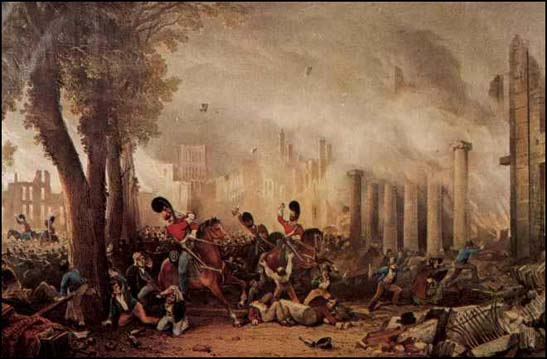Just one thing? Than I must be doing well!

Well I did say "concerns". I don't usually take a whole lot of concerns with TLs. Queries over likelihood and veracity, sure, but not concerns

And here too Britain was very supportive of the newborn republic in 1815. The problem now is figuring out who to support. The British are basically trying not to alienate any of the factions, instead waiting for a winner to emerge. In the meantime, they are trading there definitely....sadly a lot of it is war profiteering.
Fair enough. I tend to forget the smaller details like this in TLs once I have read a number of updates, and I forgot the British had shown any support for Mexico at all.
The US isn't exactly shredding them - the US did recognize Texas, but only after a Mexican government signed a peace treaty with Texas. And then they bought a strip of territory from a country whose sovereignty that the faction in power at the time made peace with and recognized as free (even if they weren't clear on borders, yeah that part's a little bad). So far the US has shown admirable restraint compared to OTL!
Well true, but so far the US has had precious little chance to nip at Mexico's heels. I did say a slow shredding, after all. This, for all we know, could simply be the start of a very long rivalry, a gradual chewing up of land and resources. Without previous clashes it's hard for me to gauge.
Yes and no. The British are pinning their hopes of 'reaching the Pacific' on developing a route across Central America, though the unpleasantness in Mexico has made that concerning.
I actually hadn't counted on reaching the Pacific to be a goal of the British at all at this point. I was looking back more with hindsight at the need to make the growth of the USA in order to keep it in check. I'm aware that the British TTL would probably simply be interested in economic expansion of the colonies and not really on proclaiming any sort of scaled down Manifest Destiny, or Sea to Shining Sea poetry.
Right now the British are treating the Texans as just one more faction in the Mexican Wars. They were coming closer to recognizing it as a country in its own right under President Brown, but Jackson makes them....nervous....

Perhaps they need to unleash 007 to...clear up the matter?

I spent a while trying to think of a suitably 19th century pseudonym for a secret agent but ultimately gave up. However, bonus points for anyone who offers a good one, and double marks for fitting in a Scarlet Pimpernel reference. I would make a joke about persuading you (Glen) to incorporate such a figure into TTL, but I think that would derail the plot just a little too much

I think one thing you are underestimating is how much the British dominate the Caribbean basin right now. Basically the Mexicans (of whatever faction) have to do business with the British or they would be in even worse shape. About the only competitor they realistically have economically in the Mexican region is the USA.
Perhaps so, I certainly had largely ignored most of it all. However, while I acknowledge the necessity for the Mexicans to trade with the British, I question whether it would allow the British the comfort of becoming blas é over the Mexicans. They might become a little less concerned over who ultimately won a war, but I think they would still take a healthy interest in supporting the most pliant candidate for the Head of State role and would want to avoid involving themselves with candidates who were unnecessarily brutal or otherwise offensive to their British sensibilities. Similarly what I'm saying is, as regards Texas then I'm not sure they would stand idly by to a Texan annexation of half of Mexico (let's face it, Texas are claiming a whole lot more here than OTL) unless either the USA was forcing them to keep out of it (still no Monroe Doctrine, remember) or they were absolutely assured of gaining Texas out of the bargain and thus were willing to use their diplomatic leverage to offer Mexico a good deal to go along with the plan. Even then I think they would be unhappy if Texas does decide to blindly leap into a war, and multiply that unhappiness by 500% if Andrew Jackson is behind it.
But that's just my thoughts on the matter.
Incidentally, with British mastery of the Caribbean, how are the few remaining non-British outposts doing? By this, I mean the Netherlands Antilles (Dutch Windward Isles at this point IIRC) and the Danish West Indies. One the one hand they might be loving the increased trade around them, but at the same time surely the sheer output of the British now must be throttling their trade? It would be a shame to see them forced to sell up, though. I love the idea of tiny outposts of distant countries surviving long past the time they should have given in

Initially considered hardship posting by the Royal Navy, nevertheless these provided an important link in the British world-spanning empire. The first colonists did not head for the region until the 1820s, mostly for the purpose of raising sheep and assisting shipping. While considered a desolate region, it was an important link in transportation from the Atlantic to the Pacific by shipping.
So the British take Patagonia. Good, I always found it an interesting proposition, and it seems half of RL Patagonia is descended from Welshmen anyway. Perhaps the capital (when Patagonia gets properly claimed and colonised, which I assume is to follow) will be at
Port Desire? It has a very neat little bay which makes it conducive to shipping and I've had an affection for it ever since I realised that it had been under on-off British claims (possibly even brief colonisation IIRC) since 1670.





